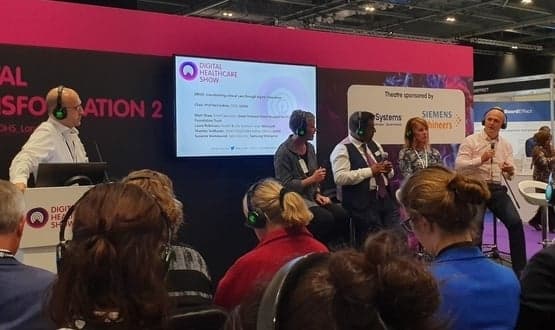Healthcare lacks ‘knowledge base’ that tech could bridge
- 28 June 2019

Healthcare is lacking a “knowledge base” that technology could provide to enable better care, a chief clinical information officer (CCIO) has said.
Great Ormond Street Hospital CCIO, Shankar Sridharan, said businesses were already ahead in collecting data to provide better customer service, and healthcare needed to do the same.
Speaking at the Digital Healthcare Show about the hospitals Digital, Research, Informatics and Virtual Environments (DRIVE) programme, Dr Sridharan said harnessing data goes beyond setting up an electronic patient record (EPR).
“An EPR collects all your data in one place and allows you to create a narrative of care, it allows you to communicate really quickly and well with your colleagues, with patients and with families,” he said.
“But there is something missing. Healthcare, generally, is missing a knowledge base.
“In any business, if you were to go to John Lewis or Selfridges, they have a knowledge base of how they deal with customers, competitors, how they deal with products and what their important ones are.”
In hospitals the only knowledge base is what a consultant or nurse individually knows about a condition, but more could be done, he said.
“We have, for example, loads of serious incidents and we have learnings from them – but is that easy to capture and replicate?” he added.
“We would like to use DRIVE to create a knowledge base, both clinically and operationally, for the hospital to provide really smart care.
“For example, a child comes in with a hole in the heart. We know that these are the serious incidents that may affect the child, this is possibly the length of stay, what other things the family might need.
“We can provide better care, we can be better at our jobs. DRIVE was never just about a children’s hospital at Great Ormond Street, but to develop a scalable thing that could do good for the NHS.”
DRIVE was developed as part of a partnership between GOSH, University College London (UCL) and leading firms in the technology, artificial intelligence (AI) and digital innovation spaces.
In October last year NHS Digital committed £1m funding for the programme, with a Memorandum of Understanding to form a template for an “ongoing broader partnership” over the next five years.
Other partners of DRIVE include Arm, Barclays, Microsoft, NHS Digital, NTT DATA and Samsung.
The five-year-project will cost £15million with funding being supplied by all of the supporting partners.
Projects that have already been started include transforming the whole of GOSH into a playable world in popular video game, Minecraft.
This allows young patients to virtually explore the hospital before they visit and meet and befriend other GOSH patients.
Dr Sridharan told the audience at ExCel London that the intention of DRIVE was to be scaled across the NHS, with hospitals able to apply learnings from the programme to their own systems.






1 Comments
Grow up NHS, many EPRs are local or regional, what all people need is a national EPR isn’t IT senior NATIONAL health leaders ? if U are going to get on a platform and talk digital and least talk sense ! Grow up NHS senior NATIONAL IT leaders , stop milking IT and start DOing IT ! commit to delivering a national EPR or “zip it” up !
Comments are closed.